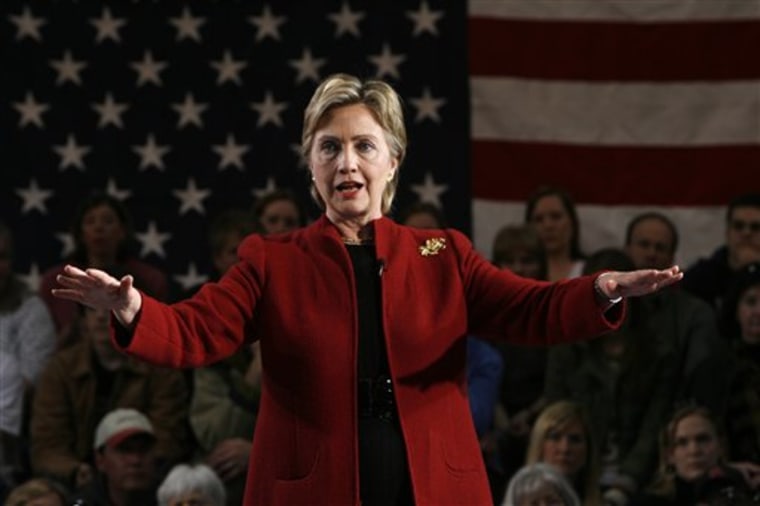For presidential candidates, home may be where the heart is, yet the wealth is in California. Hillary Rodham Clinton and Rudy Giuliani raised most of their money in New York. Illinois gave plenty to Barack Obama. North Carolina came through for John Edwards.
But the biggest donor state in the first quarter of presidential fundraising was California, typically the cash machine of presidential politics. California is now an early primary state - on Feb. 5 - and that could push the state's financial role to stratospheric levels.
"We'll see an increased presence of the candidates in California and that is likely to drive the type of small donor activity that candidates are starting to do," said Anthony Corrado, a campaign money expert at Colby College in Maine.
Near-equal opportunity donors
In the first quarter, Californians contributed about $20 million to leading presidential candidates, with Democrats holding a 3-to-2 edge over Republicans, according to an analysis of fundraising data by The Associated Press.
The candidates tapped Hollywood, Silicon Valley and wealthy zip codes in Orange County. Among Democrats, Clinton raised $5.1 million in the state, Obama $4.16 million and Edwards $2.1 million.
Among Republicans, Mitt Romney was the top California fundraiser, with $3.5 million in the state. California was also John McCain's most generous state, putting $1.7 million into his campaign.
Across the country, New York lived up to its reputation as a fundraising mecca, its totals boosted even more by Clinton, the New York senator, and Giuliani, the former mayor of New York City.
Breakneck fundraising
Altogether, the candidates raised more than $130 million nationwide, four times as much as the first quarter in 1999 when the field looked comparable to this year's.
"It shows and reflects how intense this election has been and the breakneck fundraising pace that these candidates are on," said former Federal Election Commission Chairman Michael Toner.
What's more, the Democratic candidates raised $8 for every $5 raised by Republicans.
"There's a lot of grass-roots enthusiasm for electing a Democratic president," Edwards said Monday in an interview with the AP. "Some of it is anti the war, but I think most of it is just grass-roots support for change."
He said he's impressed by the more than 100,000 donors who contributed to Obama's campaign. But he said he won't change his tactics because of the competition.
"The party that doesn't hold the White House is always more motivated to get it back, particularly after eight years of the incumbent," said Dan Schnur, a California-based political consultant who advised McCain's 2000 presidential campaign.
Still, most of the money the candidates raised came from a small group of large donors. A study by the Campaign Finance Institute found that donations under $200 amounted to only 14 percent of the total raised.
Equal access to decision makers?
Contributions of $1,000 or more accounted for 79 percent of the total raised by the candidates, the institute said, compared with 68 percent in 1999.
"You have a bunch of presidential candidates and sitting senators and governors and congressmen who are dependent on very large donations from a tiny segment of the American public," said Steven Weissman, the institute's associate director for policy. "That should certainly raise concerns for those people who are worried about equal access to decision makers."
Big donations are common at this stage in a campaign, however, as candidates build up their accounts with the easiest money to raise. Strategists and campaign finance experts say they expect smaller donations to increase, but big contributions will still provide the majority of candidate money.
'Homing' in on donors
Candidates also tapped into their home states, where donors tend to know them best. In New York, Clinton raised $7 million and Giuliani $3 million, most of it in New York City. McCain raised $1.25 million in Arizona and Obama raised $3.8 million in his home state of Illinois.
Romney, the former governor of Massachusetts and a Mormon, found an adoptive home in Utah, where the Mormon Church is headquartered. His top three donor zip codes were in Provo, Alpine and Salt Lake City.
Likewise, his donor list is replete with wealthy Mormon businessmen such as hotel magnate J. Willard Marriott; JetBlue Airways CEO David Neeleman and Black & Decker CEO Nolan Archibald.
Romney's first name is Willard. He was named for his father's friend, J. Willard Marriott.
Seven Manhattan zip codes in the wealthy neighborhoods around Central Park contributed $7 million to the leading candidates, the highest geographic concentration of presidential campaign money. Beverly Hills' famous "90210" zip code contributed $747,000, the most generous zip code in California. And Washington's expensive Georgetown neighborhood, the 20007 zip code, also ranked high with contributions of $578,000.
For most leading candidates, the first quarter ended in a flurry of fundraising activity. Top candidates issued urgent appeals for money, using the approaching deadline as a motivational device. Nearly $10 million of Clinton's contributions were dated the last three days of the quarter. Obama reported nearly $7 million and Giuliani $3.7 million in the last 72 hours.
Aides said the flurry was a result of last-minute deposits and donations.
